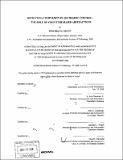Mitigating complexity in Air Traffic Control : the role of structure-based abstractions
Author(s)
Histon, Jonathan M
DownloadFull printable version (43.06Mb)
Other Contributors
Massachusetts Institute of Technology. Dept. of Aeronautics and Astronautics.
Advisor
R. John Hansman, Jr.
Terms of use
Metadata
Show full item recordAbstract
Cognitive complexity is a limiting factor on the capacity and efficiency of the Air Traffic Control (ATC) system. A multi-faceted cognitive ethnography approach shows that structure, defined as the physical and informational elements that organize and arrange the ATC environment, plays an important role in helping controllers mitigate cognitive complexity. Key influences of structure in the operational environment and on controller cognitive processes are incorporated into a cognitive process model. Controllers are hypothesized to internalize the structural influences in the form of abstractions simplifying their working mental model of the situation. By simplifying their working mental model, these structure-based abstractions reduce cognitive complexity. Four examples of structure-based abstractions are identified and mechanisms by which they reduce cognitive complexity described. Experimental evidence is presented to support a key cognitive complexity reduction mechanism, the reduction of the "order", or the degrees-of-freedom, of a controller's working mental model. The use of structure-based abstractions is dynamic and responsive to changes in task conditions; these changes are hypothesized to reflect transitions between distinct operating modes. Experimental evidence of such changes in the use of standard flows in the airspace is presented. The cognitive process model and the concept of structure-based abstractions are shown to be useful tools for identifying cognitive complexity considerations arising from changes to the structure of the ATC system. Examples of cognitive complexity considerations for four opportunities to increase the efficiency, capacity, and robustness of the ATC system are presented. The cognitive process model is also used as part of a cognitive review of the current en route controller training system. This review revealed key pedagogical techniques used to teach structure, factors creating the need for sector-specific mental models and abstractions, and opportunities to improve the efficiency of controller training, such as developing more generic airspace. (cont.) The results show structure is a significant factor in controller cognitive complexity. Accounting for its impacts is critical for transitioning to future concepts of operations. The cognitive process model and recognition of controller use of structure-based abstractions provide an improved basis for assessing opportunities to improve system performance.
Description
Thesis (Ph. D.)--Massachusetts Institute of Technology, Dept. of Aeronautics and Astronautics, 2008. Page 232 blank. Includes bibliographical references (p. 209-218).
Date issued
2008Department
Massachusetts Institute of Technology. Department of Aeronautics and AstronauticsPublisher
Massachusetts Institute of Technology
Keywords
Aeronautics and Astronautics.